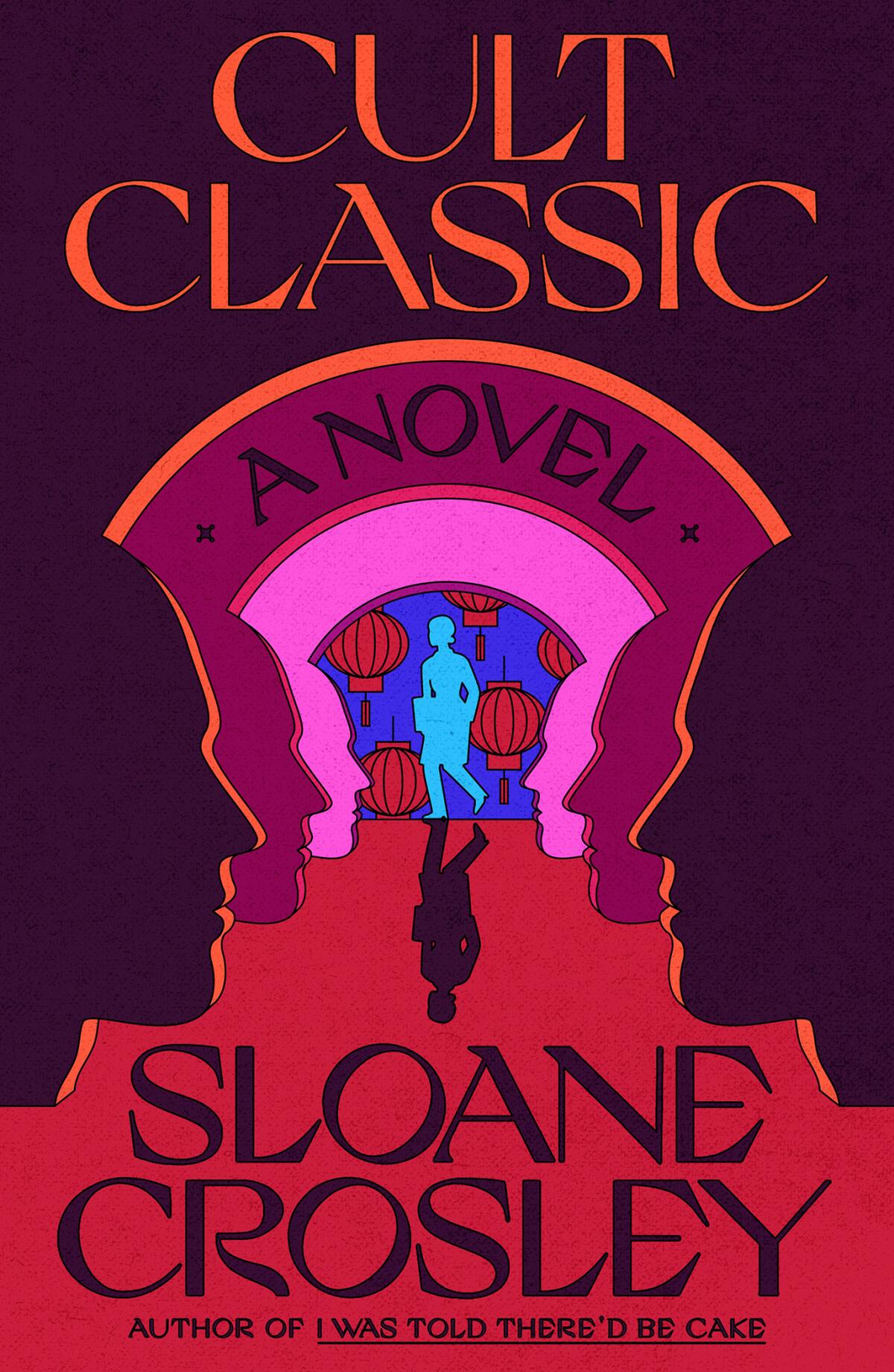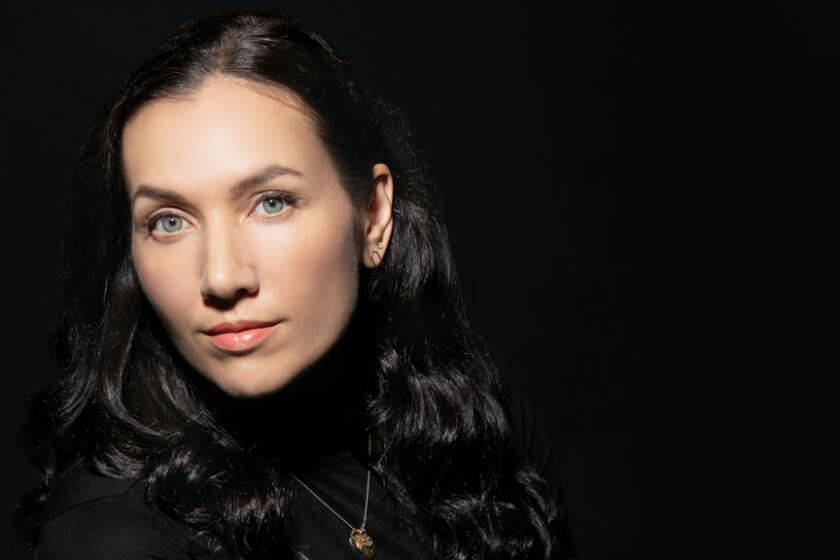All her exes live in Chinatown: Sloane Crosley’s romantic-chaos caper, ‘Cult Classic’

- Share via
On the Shelf
'Cult Classic'
By Sloane Crosley
MCD: 304 pages, $27
If you buy books linked on our site, The Times may earn a commission from Bookshop.org, whose fees support independent bookstores.
The opening essay of Sloane Crosley’s bestselling debut, “I Was Told There’d Be Cake,” involves an accidental collection of toy ponies Crosley had received over the years from men she dated. If a guy said, “I have something for you,” she’d reply, “Is it a pony?” Though she refers to her equine quip as “a nervous tic and a cheap joke,” she also notes that “on our second date, if I ask again, I’m pretty sure I’m getting a pony.” Unable to throw them out, she leaves them to languish in a drawer. She’s too nostalgia-prone to get rid of them, too embarrassed to display them.
“The Pony Problem” captures many of the qualities that distinguish Crosley’s pieces from the 21st century’s personal-essay glut. It’s funny and honest and emotionally resonant, and it features the template for much of her writing: She uses a highly specific and accessible premise (ponies) to dissect underlying themes (her exes, her past, the sometimes delightful and sometimes depressing conventions of romance).
It also feels like it could have been written by the protagonist of Crosley’s second novel, “Cult Classic.” Lola is a Manhattanite in her late 30s who, like Crosley, works in media and struggles to contextualize and move on from her previous relationships. She’s engaged to a solid but predictable guy she calls Boots, with whom she has “an agreement never to speak about our exes unless absolutely necessary,” which is troubling for someone who, as she puts it, received “smaller denominations from the romance ATM than others.”

One night, while out with friends in Chinatown, Lola runs into one of those five-dollar ex-boyfriends. The following night, dining out again at the same restaurant (because a visiting friend read about it), Lola runs into another ex. The day after that, while accompanying her friend Vadis as she runs errands for her socialite boss, Lola spots yet another past lover. Initially confounded by these chance encounters, she soon discovers they aren’t coincidences at all.
Lola and Vadis used to work together for a magazine called Modern Psychology, now defunct but once “the world’s preeminent psychology periodical,” for an editor-in-chief named Clive. Since the magazine folded, Clive has turned into “a full-blown psych guru” who “posted Carl Jung quotes on social media” and briefly hosted his own TV show. Now, Lola learns, Clive, along with Vadis, has launched a new venture called the Golconda, a secretive enterprise run out of an abandoned synagogue.
Sloane Crosley is known for her essay collections “How Did You Get This Number?”
The premise behind the Golconda is kind of a remix of David Fincher’s “The Game,” Charles Dickens’ “A Christmas Carol” and Michel Gondry’s “Eternal Sunshine of the Spotless Mind.” Using “a combination of subliminal messaging mixed with meditation” and a heavy dose of social media surveillance, Clive’s cabal can offer clients the opportunity to grapple with their romantic histories via elaborately arranged encounters. A package called “In Flight,” for example, ensures that a client will be “seated next to an ex every time you board an airplane.” Unbeknownst to Lola, she’s been experiencing the “Classic” — a guinea pig chosen for her proximity and her crowded love life.
Lola is outraged over the deception, manipulation and downright creepiness of the project, but she agrees to continue participating (and even report back after each run-in) because her “devotion to the past” borders on obsessive. If she’s going to marry Boots, it would be best to reckon with her romantic history before committing to her matrimonial future. Is Boots the smart, stable choice after years of incompatible suitors? Or is he a boring overcorrection to an endless series of interesting failures? Who, after all, gets the chance to find closure with the help of a well-funded secret society?
Crosley’s first novel, “The Clasp,” was a caper that divided its third-person narration among three protagonists. “Cult Classic” employs the same first-person style as her essays, which results in a more intimate dynamic between reader and narrator. Lola is observant, cynical and so self-aware it makes progress difficult — a watched pot refusing to boil. “No breakup,” she argues at one point, “is complete until you dig like a pair of truffle-sniffing pigs to find out what happened.” Constant self-scrutiny, even when performed earnestly, can be a form of stagnation, particularly when the stakes are as high as Lola imagines them to be.
Memoirist Melissa Febos attacks the gender dynamics of the anti-personal-essay crowd in “Body Work: The Radical Power of Personal Narrative.”
“This is how romantic love keeps itself from going extinct, right?” she argues. “How it swindles itself into sentience. Romance may be the world’s oldest cult. It hooks you when you’re vulnerable, holds your deepest fears as collateral, renames you something like ‘baby,’ brainwashes you, then makes you think that your soul will wither and die if you let go of a person who loved you.”
Lola’s wit and savvy make her a genial narrator, but it’s her emotional honesty that makes her a strong one. Crosley’s writing is as funny as ever, with a great line or clever observation on nearly every page. (“May our gaslights illuminate the bridges we burn!”) The absurdity of the premise is made palatable by Lola’s natural skepticism, which allows Crosley to have some fun orchestrating the twists and turns of the plot. As in her essays, her fascinating conceits — entertaining and compelling in their own right — are the engines of the narrative, but her insights into contemporary life are the fuel.
The only slight misstep occurs at the conclusion, which is presented as a happy one but manages to be bleak instead. Lola’s narrative seems to have been leading instead to a place less resolved, more like life in its messiness. I prefer the ending of “The Pony Problem.” Crosley finally decides to collect the plastic ponies into a bag, take them to the subway, leave them under a seat and never look back.
Clark is the author of “An Oasis of Horror in a Desert of Boredom” and the forthcoming “Skateboard.”
Adrienne Celt’s ‘End of the World House’ takes the format behind ‘Russian Doll’ and ‘Palm Springs’ into the complicated realm of female friendship.
Crosley will speak about her new novel with Judy Greer at the Mark Taper Auditorium-Central Library on June 16 at 7:30 p.m.
More to Read
Sign up for our Book Club newsletter
Get the latest news, events and more from the Los Angeles Times Book Club, and help us get L.A. reading and talking.
You may occasionally receive promotional content from the Los Angeles Times.












